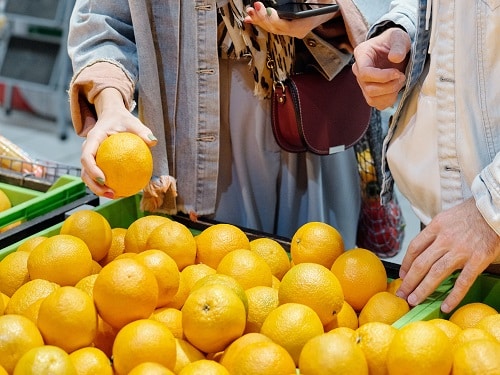Tesco and Asda have announced that they are to trial the use of a coating for fruit that’s made from the same materials found in peels, seeds, and pulps as a way to extend shelf life, fight food waste, and reduce the need for packaging.
Tackling Food Waste
The UK throws away a staggering 6.6 million tonnes of household food waste a year! 400,000 tonnes of that is fruit. For example, each day we throw away an average of 720,000 whole oranges. Much of this fruit is thrown away because it has perished, e.g. gone mouldy or started to decay. This is why there is room for a solution that can cut down on food waste but doesn’t involve extra packaging.
Tackling The Challenge of Plastic Pollution From Food Packaging
Also, the results of a study by The Waste and Resources Action Programme (WRAP), has led to some recommendations related to fresh fruit and vegetable retail packaging. The recommendations are that:
– Fresh fruit and vegetables should be sold loose where possible, unless it is shown that plastic packaging reduces overall food waste.
– Unless it can be shown that a ‘Best Before’ label reduces overall food waste, date labels should be removed. WRAP says this would prevent 14 million shopping baskets worth of food from going to waste and 1,100 rubbish trucks of avoidable plastic simply by allowing people to buy what they need.
– Customers should be helped to understand the benefits of storing appropriate fresh produce in the fridge, set at the right temperature (i.e. below 5°C). This could help prolong the life of fresh fruit and veg and help reduce food waste.
WRAP has also called for the removal of more unnecessary and problematic single use plastic items under The UK Plastics Pact, including wrapping on multi-packs of tinned food and sauce sachets in restaurants.
Apeel Coating Trial
It is with tackling these issues in mind that Tesco and Asda have agreed to trial a new coating for fresh fruit and vegetables. The invisible, tasteless, odourless coating called ‘Apeel’ is made from plant-derived materials, lipids, and glycerolipids that exist in the peels, seeds, and pulp of all fruits and vegetables. Coating fruits (and vegetables) in Apeel (spraying, dipping, or brushing) is claimed to slow spoilage by helping to keep moisture in and oxygen out. It is also claimed that Apeel will reduce reliance on refrigeration, thereby increasing its green credibility. The makers of Apeel claim that the coating makes produce lasts twice as long.
Asda has announced that it will soon be using the Apeel coating on citrus fruit and avocados in more than 150 stores. Tesco has announced that it will be using Apeel to coat oranges and lemons sold in 80 stores in the Peterborough area and will be studying the difference that the coating makes to the fruits’ shelf life.
Promising
Sarah Bradbury, Tesco Group quality director, said “Apeel could be a powerful tool in helping us cut waste in our supply chain and help customers reduce it in their homes”.
Asda’s senior director, Dominic Edwards, said “During this programme, we will be learning more about the benefits of longer-lasting produce for our customers, and we are looking forward to seeing what further developments this could lead to in the future”.
What Does This Mean For Your Organisation?
The UK produces far too much food waste and there is a cogent argument that UK supermarkets are still selling products with too much unnecessary (plastic) packaging, all of which is bad for the environment. If Apeel, which is made from natural ingredients anyway, really can make fresh produce last twice as long, this could be one great way to tackle three big problems at once – reducing the need for packaging, reducing the need for refrigeration, and reducing fresh food waste. This will be good news for the supermarkets in terms of lowering costs and helping them to meet their environmental targets. It would also be good news for consumers by reducing their shopping costs (less waste, food lasting longer), and giving a safe, environmentally friendly choice in their shopping (if they were made aware of the benefits of the coating). For other fresh food businesses this coating is likely to be of interest, and now it remains to be seen if the claims match up to the results as noted by Asda and Tesco at the end of the trial.




